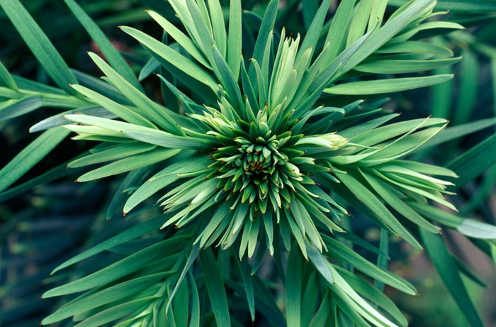Conservation genomics for threatened flora
The Research Centre for Ecosystem Resilience supports threatened flora conservation programs by providing genomic information that guides how best to restore and conserve resilient healthy plant populations.
Using cutting-edge genomic technologies, our research supports the NSW Government’s Saving our Species and Assets of Intergenerational Significance programs, and informs the recovery and long term management of threatened flora.
We have developed a simple, standardized workflow that streamlines the collection, analysis and application of genomic information across diverse threatened plant species.
We advocate for a shift away from questioning whether genomic information is needed, and toward asking: what critical conservation questions can genomic data help us answer?
The key publications below showcase our approach, highlighting the workflow, the cost-effectiveness, and the importance of integrating genomics into conservation planning:
- A conservation genomics workflow to guide practical management actions.
- Conservation genomics within government-led conservation planning: an Australian case study exploring cost and benefit for threatened flora.
- The impact of taxonomic confusion on conservation resources – Why population genomics should inform threatened species determination.
Latest update
In the first half of 2025, the Research Centre for Ecosystem Resilience completed four conservation genomics reports - Grevillea beadleana, Davidsonia johnsonii, Leionema lamprophyllum subsp. fractum, Microtis angusii, co-hosted a joint Genomics-Seed workshop with PlantBank for NPWS officers, participated in the ICCB workshop in Brisbane and contributed to four scientific publications (Cascini et al. 2025, Doyle et al. 2025, McMaster et al. 2025a, 2025b).
A list of conservation genomics reports completed by the Research Centre for Ecosystem Resilience
(updated as of 8/7/2025)
The Research Centre for Ecosystem Resilience has undertaken an extensive body of conservation genomics work across a wide range of threatened species to directly inform key conservation actions such as translocations, the establishment of ex-situ collections, and the resolution of taxonomic uncertainties.
The species listed below are the subject of completed reports that have supported a number of agencies within the NSW Government and projects involving Transport NSW, various Botanic Gardens and the Big Scrub Conservancy. Links are provided for species included in our research publications.
For more information, please contact Samantha Yap.
(updated as of 8/7/2025)
The Research Centre for Ecosystem Resilience has undertaken an extensive body of conservation genomics work across a wide range of threatened species to directly inform key conservation actions such as translocations, the establishment of ex-situ collections, and the resolution of taxonomic uncertainties.
The species listed below are the subject of completed reports that have supported a number of agencies within the NSW Government and projects involving Transport NSW, various Botanic Gardens and the Big Scrub Conservancy. Links are provided for species included in our research publications.
For more information, please contact Samantha Yap.
| Acacia gordonii |
| Acacia meiantha |
| Acacia terminalis subsp. Eastern Sydney |
| Astrotricha crassifolia |
| Astrotricha roddii |
| Baloghia marmorata |
| Banksia vincentia |
| Bertya opponens |
| Bossiaea bombayensis |
| Bossiaea fragrans |
| Bossiaea milesiae |
| Caesia parviflora var. minor |
| Calystegia affinis |
| Chamaesyce psammogeton |
| Corokia whiteana |
| Daphnandra johnsonii |
| Davidsonia johnsonii |
| Diploglottis campbellii |
| Eidothea hardeniana |
| Elaeocarpus sedentarius |
| Endiandra floydii |
| Endiandra hayesii |
| Eucalyptus camaldulensis subsp. camaldulensis |
| Eucalyptus langleyi |
| Eucalyptus sturgissiana |
| Eucalyptus sp. Cattai AKA E. cryptica |
| Eucalyptus tetrapleura |
| Floydia praealta |
| Fontainea oraria |
| Grevillea beadleana |
| Haloragodendron lucasii |
| Hibbertia puberula subsp. glabrescens |
| Hibbertia spanantha |
| Hicksbeachia pinnatifolia |
| Homoranthus bebo |
| Homoranthus binghiensis |
| Homoranthus bruhlii |
| Homoranthus croftianus |
| Homoranthus darwinioides |
| Homoranthus elusus |
| Homoranthus floydii |
| Homoranthus lunatus |
| Homoranthus prolixus |
| Isopogon fletcheri |
| Leionema lamprophyllum subsp. fractum |
| Lenwebbia sp. Main Range |
| Marsdenia longiloba |
| Microtis angusii |
| Niemeyera whitei |
| Owenia cepiodora |
| Persoonia hirsuta |
| Persoonia pauciflora |
| Pherosphaera fitzgeraldii |
| Pimelea cremnophila |
| Pimelea spicata |
| Pimelea venosa |
| Pittosporum kororoense |
| Polystichum moorei |
| Pomaderris cocoparrana |
| Pomaderris delicata |
| Pomaderris queenslandica |
| Prostanthera askania |
| Prostanthera densa |
| Prostanthera marifolia |
| Pultenaea maritima |
| Pultenaea imminuta |
| Pultenaea parviflora |
| Rhizanthella slateri |
| Rhodamnia maideniana |
| Rhodamnia rubescens |
| Rhodomyrtus psidioides |
| Syzygium hodgkinsoniae |
| Syzygium paniculatum |
| Uromyrtus australis |
| Wollemia nobilis |
| Xylosma terrae-reginae |
| Zieria baeuerlenii |
| Zieria covenyi |
| Zieria obcordata |
Related information:


